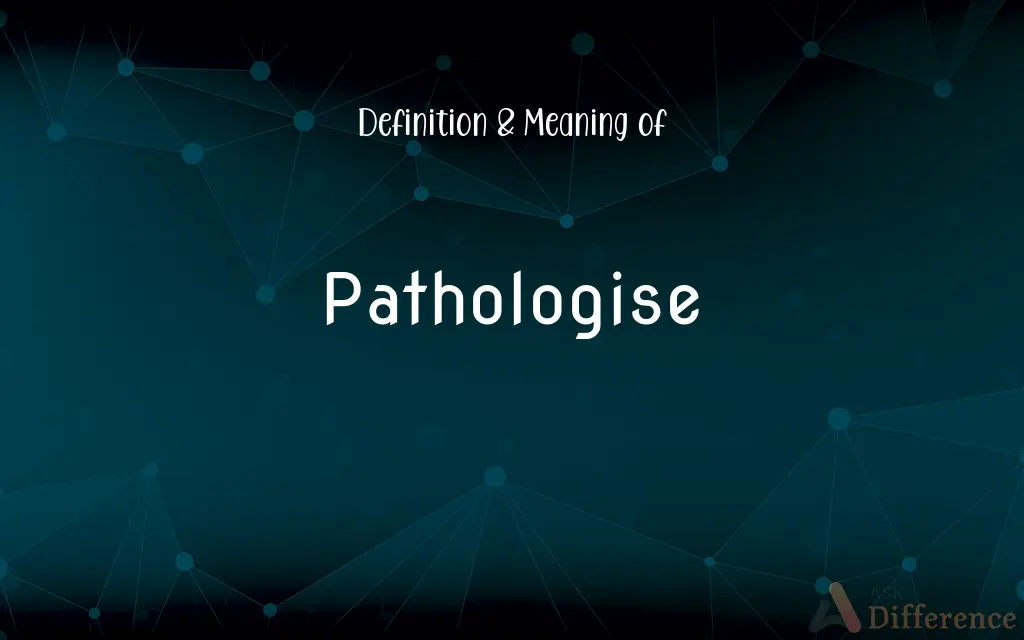Pathologise Definition and Meaning
By Fiza Rafique & Maham Liaqat — Published on May 11, 2024
To pathologise means to view or treat as medically or psychologically abnormal or unhealthy. e.g., The study aimed not to pathologise the children's behavior but to understand it.

Table of Contents
Pathologise Definitions
To make a medical or psychological problem out of something.
Society tends to pathologise normal emotional responses to stress.
To regard or treat something as caused by a disease or disorder.
Doctors tend to pathologise symptoms without considering holistic health.
To interpret or represent as being pathological.
The media often pathologises the actions of celebrities.
To apply medical or psychological terms to non-medical phenomena.
Some educators pathologise normal childhood energy as hyperactivity.
To consider or analyze something in terms of disease pathology.
Researchers pathologise addiction to understand its neurological impact.
To view or describe something as unhealthy or abnormal.
Pathologising sadness can prevent people from processing their emotions.
To convert a normal condition into a disease or disorder.
Overemphasis on productivity can pathologise rest and leisure.
To identify or treat something as requiring medical intervention.
The tendency to pathologise aging overlooks its natural process.
To classify or diagnose behavior or conditions as pathological.
The therapist cautioned against pathologising the patient's coping mechanisms.
To ascribe pathological causes to behaviors or conditions.
It's important not to pathologise cultural practices unfamiliar to us.
Alternative spelling of pathologize
Pathologise Snonyms
Medicalize
To treat or view as a medical matter.
There's a trend to medicalize aspects of normal life, like fatigue.
Stigmatize
To describe or regard as worthy of disgrace or great disapproval.
Stigmatizing mental health issues discourages seeking help.
Diagnose
To identify the nature of (an illness or problem) by examination of the symptoms.
Psychologists diagnose certain behaviors as disorders based on criteria.
Classify
To arrange in a class or category.
Classifying diverse learning styles as disabilities can be misleading.
Psychopathologize
To interpret or treat as a psychological disorder.
It's crucial not to psychopathologize normal grief and loss.
Disorder
To classify or treat as a disorder.
The manual disorders various behaviors under specific categories.
Label
To assign to a category, especially inaccurately or restrictively.
Labeling energetic children as disruptive can be harmful.
Disease
To treat as a disease or pathological condition.
Society often diseases obesity rather than addressing lifestyle and environment.
Abnormalize
To make or consider abnormal.
Abnormalizing introversion in an extroverted society can lead to misunderstanding.
Stereotype
To believe unfairly that all things or people with a particular characteristic are the same.
Stereotyping certain behaviors as crazy can be harmful.
Pathologise Example Sentences
Critics argue that we pathologise too many aspects of normal human behavior.
The book explores how society tends to pathologise aging.
Teachers are trained not to pathologise every instance of inattention.
Experts debated whether to pathologise certain types of internet use.
Parents were advised not to pathologise their teenager's mood swings.
Common Curiosities
Why is it called "pathologise"?
"Pathologise" is called so because it involves viewing or treating something as pathological or diseased, deriving from "pathology," the study of diseases.
What is a stressed syllable in "pathologise"?
The stressed syllable in "pathologise" is the second syllable: -thol-.
How do we divide "pathologise" into syllables?
"Pathologise" is divided into syllables as pa-thol-o-gise.
What is the pronunciation of "pathologise"?
The pronunciation of "pathologise" is /pəˈθɒlədʒaɪz/ in phonetic script.
How is "pathologise" used in a sentence?
"Pathologise" is used to describe the action of regarding or treating a behavior or process as psychologically abnormal or unhealthy, e.g., Society tends to pathologise shyness as a disorder.
What is the second form of "pathologise"?
The second form of "pathologise" is "pathologised."
How many syllables are in "pathologise"?
There are four syllables in "pathologise."
What is the first form of "pathologise"?
The first form of "pathologise" is "pathologise."
What is the third form of "pathologise"?
The third form of "pathologise" is also "pathologised."
What is another term for "pathologise"?
Another term for "pathologise" could be "medicalize," referring to treating something as a medical issue.
What is the singular form of "pathologise"?
The singular form of "pathologise" is "pathologise."
What is the root word of "pathologise"?
The root word of "pathologise" is "pathology," which comes from the Greek words "pathos" meaning "disease" and "-logy" meaning "study of."
What is the verb form of "pathologise"?
The verb form of "pathologise" is "to pathologise."
What part of speech is "pathologise"?
"Pathologise" is used as a verb.
Is "pathologise" an adverb?
No, "pathologise" is not an adverb.
Is the "pathologise" term a metaphor?
"Pathologise" can be used metaphorically to describe the act of treating non-medical issues as if they were medical conditions.
Is the word "pathologise" Gerund?
When "pathologise" is used in a gerund form, it acts as a noun, e.g., "Pathologising certain behaviors can lead to stigmatization."
Is the word “pathologise” a Direct object or an Indirect object?
As a verb, "pathologise" does not serve as a direct or indirect object; however, it can have direct or indirect objects, e.g., "They pathologise (direct object) his behavior without understanding the context."
What is the plural form of "pathologise"?
"Pathologise" does not have a plural form as it is a verb; its action can be applied to multiple subjects without changing form.
Is "pathologise" a vowel or consonant?
The first letter of "pathologise," "p," is a consonant.
What is the opposite of "pathologise"?
The opposite of "pathologise" might be "normalise" or "depathologise," meaning to consider something as normal or not diseased.
Is "pathologise" an abstract noun?
No, "pathologise" is not an abstract noun; it's a verb.
Is "pathologise" a negative or positive word?
"Pathologise" is generally considered negative as it involves treating something as abnormal or diseased.
Is "pathologise" a countable noun?
No, "pathologise" is not a noun; it is a verb and therefore not countable.
Is "pathologise" a collective noun?
No, "pathologise" is not a collective noun as it is a verb.
Is the word "pathologise" imperative?
"Pathologise" can be used in the imperative mood in commands or requests, e.g., "Do not pathologise every minor behavior as a disorder."
Which determiner is used with "pathologise"?
Determiners are not typically used with verbs like "pathologise."
Which vowel is used before "pathologise"?
There is no set rule for which vowel comes before "pathologise" as it is a verb and its use depends on the sentence structure.
Which preposition is used with "pathologise"?
Prepositions such as "as" can be used with "pathologise," e.g., "to pathologise something as a disease."
Which conjunction is used with "pathologise"?
Conjunctions such as "and" or "but" can be used in sentences containing "pathologise," e.g., "You should not pathologise every unusual behavior and overlook its potential benefits."
Is "pathologise" a noun or adjective?
"Pathologise" is a verb.
Which article is used with "pathologise"?
Articles are not typically used directly with verbs like "pathologise."
Share Your Discovery

Previous Term
Imaginarily Definition and Meaning
Next Term
Standardise Definition and MeaningAuthor Spotlight
Written by
Fiza RafiqueFiza Rafique is a skilled content writer at AskDifference.com, where she meticulously refines and enhances written pieces. Drawing from her vast editorial expertise, Fiza ensures clarity, accuracy, and precision in every article. Passionate about language, she continually seeks to elevate the quality of content for readers worldwide.
Co-written by
Maham Liaqat


































